Vishnu
stands serenely detached from the material world, standing up for moral good
and cosmic order. His consort, Lakshmi, on the other hand, provides the good
things of the material life.
When
they became one, they created Madana, the lord of pleasure, to show man and
woman the wonders of life.
Madana's
birth filled with world with joy. Nature came alive flowers bloomed, birds
sang.
His
consorts, Priti and Rati, goddesses of love and longing, held aloft his banner
and let the world see his insignia the makara symbol of growth and enrichment.
"I
will make all creatures aware of rasa, the vitality of creation its beauty,
mystery and wisdom," said Madana.
Yearning for Life
Madam
raised his sugarcane bow and shot flowery darts into the heart of every man and
every woman, rousing their five senses, making them touch, taste, hear, smell
and see the delights of the material world.
Suddenly
samsara with its endless births and rebirths did not seem meaningless anymore;
it was exciting, inspiring, intriguing. Man and woman learnt to enjoy life.
Intoxicated
by Madana's arrows, the cosmos became a realm of pleasurable possibilities; in
its vibrations, man and woman sensed the pulse of the divine.
Fear of Death
With
the yearning for life, came the fear of death.
Tormented
men and women asked Vishnu, "How do we live forever?"
The
lord replied, "Nothing is eternal in this world. But all those who die
will be reborn."
Vishnu
revealed the procreative power of pleasure and became the guardian of embryos,
to be invoked during the rites of conception, garbhadhana-samskara.
Divine
Couple Roused by Madana, man and woman experienced the fullness of life: its
sublime and sensual nature.
Together
they became dampati, keepers of homes. And every home, filled with their love,
became a Vaikuntha, a safe haven where life is nurtured.
Maithuna
images of man and woman in embrace, symbolizing love, interdependence and
completeness are therefore considered auspicious and placed on temple walls.
Andhaka's Lust
When
the demon Andhaka cast his lecherous eyes upon the women of the world, the lord
said, "Pleasure can delight the wise and lead him to divine ecstasy; it
can also delude the fool and take him to his doom."
Taking
the form of Mohini, the celestial enchantress, Vishnu multiplied himself a
hundred thousand times until Andhaka could see ravishing nymphs wherever he
looked.
Surrounded
by so much temptation, Andhaka was driven to madness.
Virochana Cuts his Head
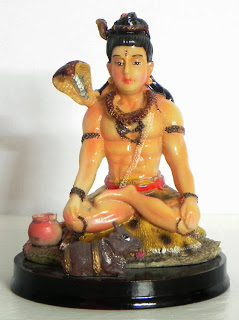 Virochana,
king of the demons, considered himself to be the most powerful being in the
three worlds.
Virochana,
king of the demons, considered himself to be the most powerful being in the
three worlds.
On
his way to conquer the heavens, he saw Mohini.
Overwhelmed
by desire, he abandoned his plan to fight the gods. Instead he began chasing
the enchantress, begging her to be his wife.
"What
will you give me if I agree?" she asked.
"Anything
you want." promised Virochana.
"Give
me your head," said Mohini. The demon immediately took his sword and
beheaded himself.
Holding
aloft the head of Virochana, Vishnu said, "Behold the fall of this mighty
man he sought to be master of the three worlds but failed to conquer his own
desires."
Shiva Rejects the Material World
To
transcend the wiles of samsara, Shiva, the celestial ascetic, shut his eyes,
opening them only to destroy the world when it disturbed his meditation.
"Unless
Shiva takes a wife, he will constantly be a threat to worldly existence,"
said Brahma.
Vishnu
waited for a suitable opportunity to make Shiva participate in samsara without
incurring his terrible wrath.
Mohini Saves Shiva
Shiva
once unthinkingly gave the demon Vrika the power to burn anyone to death by the
touch of his hand.
When
the demon stretched out his hand to test his power on Shiva himself, Shiva
realized his mistake and ran for his life. Vrika pursued him across the three
worlds.
To
rescue Shiva, Vishnu appeared as Mohini and distracted Vrika. Her inviting eyes
made the demon forget all about the chase. "May I embrace you?" Vrika
begged.
"You
may, but only if you dance as I do," so saying Mohini began dancing. Vrika
followed her every move, moving hand and limb as she did.
At
one point, Mohini touched her head; Vrika, bewitched by the enchantress, did
the same and burst into flames.
Mohini Charms Shiva
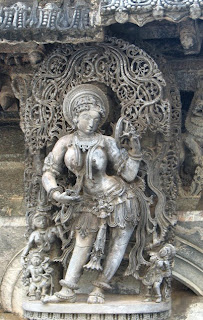 Shiva,
the divine ascetic, became enchanted by Mohini's beauty. From their union came
a vira, a brave knight, galloping on a white horse, waving a lance.
Shiva,
the divine ascetic, became enchanted by Mohini's beauty. From their union came
a vira, a brave knight, galloping on a white horse, waving a lance.
It
was Hari-Hara-suta, the son of Shiva and Vishnu-Mohini. Known variously as
Aiyanar, Velan, Ayyappa, Sastha, he helped gods fight demons and became
guardian of human settlements.
Sati and Shiva
Drawn
back into samsara by Vishnu, Shiva agreed to take a wife. He married Sati,
daughter of Daksha, the great priest-king, and immersed himself so completely
in conjugal life that he ignored the world around, even disregarding his
father-in-law.
In
retaliation, the proud Daksha organised a grand yagna inviting every creature
in the cosmos except Shiva.
Enraged
by her father's pettiness, Sati decided to disrupt the sacrifice. She rushed
into Daksha's palace and leapt to her death in the sacred fire-altar so that
the ritual, contaminated by her blood, ground to a halt.
Vishnu Destroys Sati's Corpse
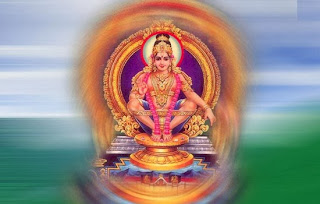 Sati's
death broke Shiva's heart. In fury, he raised his trident and beheaded Daksha.
He then wandered across the galaxies carrying Sati's charred remains in his
arms, unable to bear the agony of separation.
Sati's
death broke Shiva's heart. In fury, he raised his trident and beheaded Daksha.
He then wandered across the galaxies carrying Sati's charred remains in his
arms, unable to bear the agony of separation.
Watching
Shiva weep, the denizens of the three worlds realized the terrible price of
pleasure pain. Shiva's sorrow disrupted the workings of the cosmos. To save the
world, Vishnu let loose his Sudarshan-chakra and cut Sati's corpse into a
thousand pieces.
"You
have destroyed my Sati," cried Shiva.
"No,"
said Vishnu, "All I have destroyed is the body that had once ensheathed
her soul. She will be reborn, for nothing in the material world is permanent,
neither death nor sorrow."
Death of Madana
With
Sati's corpse gone, Shiva became a hermit isolating himself in a dark cave.
Sati, reborn as Parvati, princess of the mountains, tried in vain to draw him
out. Finally, to rouse love in Shiva's heart she summoned Madana.
Madana's
presence in Shiva's cave transformed the cold desolate abode of the hermit into
a paradise for lovers, filled with the heady scent of spring flowers.
Madana
shot a love-arrow at Shiva. But the ascetic was not amused. He opened his third
eye and released flames of fury that reduced Madana to ashes.
A World Without Madana
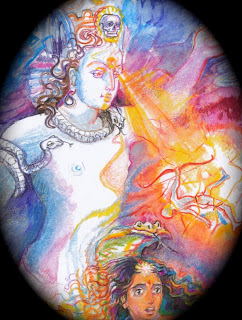 Disturbed
by the death of Madana, Vishnu said, "Behold the universe without the lord
of pleasure: there is no rasa, no love, no joy, no beauty ... samsara has
become a wasteland."
Disturbed
by the death of Madana, Vishnu said, "Behold the universe without the lord
of pleasure: there is no rasa, no love, no joy, no beauty ... samsara has
become a wasteland."
"Madam
deserved to die," argued Shiva. "He brought pleasure and pain to the
world, binding all creatures to the flesh, distracting them from the
divine."
"Madana
simply revealed the possibilities of life its beauty and bliss. Pain and
disappointment stem not from his arrows but from the ego's refusal to accept
the cosmic truth all that comes must go."
Madana Resurrected
Shiva
saw the wisdom of Vishnu's words. Accepting the transitory nature of all
things, he agreed to be part of worldly life.
Parvati,
the princess of the mountains, was the chosen bride, Brahma the officiating
priest. Vishnu, acting as the brother of the bride, gave her away.
The
cosmos rejoiced.
On
the icy peaks of Kailasa, as Shiva rediscovered love, Madana was reborn. The
twang of his bow was heard across the cosmos once more.
Madana to Mohana
Though
resurrected after his tryst with Shiva, Madana remained invisible. He existed
in spirit as Ananga, the bodiless one.
Rati
and Priti, the consorts of Madana, could not bear the thought of never gazing
upon their lord's handsome face.
Moved
by their lamentations, Vishnu said, "The world will rediscover the delight
of Madana in its purest form in Krishna. Go-loka in Vaikuntha will be the new
pleasure-garden where Krishna as the cosmic beloved, Mohana, will enchant all
with the music of love. The fun, the frolic, the joy of rain-drenched days and
moonlit nights will all be there. Only rati-krida, the dance of amorous embrace
will be elevated to rasa-leela, the dance of divine union, while bhukti, the
unrestrained pleasures of Madana will transcend into bhakti, the ecstatic
devotion for Krishna."
Writer Name: Devdutt Pattanaik
 Virochana,
king of the demons, considered himself to be the most powerful being in the
three worlds.
Virochana,
king of the demons, considered himself to be the most powerful being in the
three worlds.  Shiva,
the divine ascetic, became enchanted by Mohini's beauty. From their union came
a vira, a brave knight, galloping on a white horse, waving a lance.
Shiva,
the divine ascetic, became enchanted by Mohini's beauty. From their union came
a vira, a brave knight, galloping on a white horse, waving a lance.  Sati's
death broke Shiva's heart. In fury, he raised his trident and beheaded Daksha.
He then wandered across the galaxies carrying Sati's charred remains in his
arms, unable to bear the agony of separation.
Sati's
death broke Shiva's heart. In fury, he raised his trident and beheaded Daksha.
He then wandered across the galaxies carrying Sati's charred remains in his
arms, unable to bear the agony of separation.  Disturbed
by the death of Madana, Vishnu said, "Behold the universe without the lord
of pleasure: there is no rasa, no love, no joy, no beauty ... samsara has
become a wasteland."
Disturbed
by the death of Madana, Vishnu said, "Behold the universe without the lord
of pleasure: there is no rasa, no love, no joy, no beauty ... samsara has
become a wasteland." 
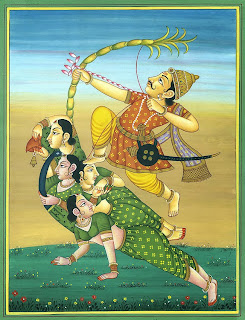

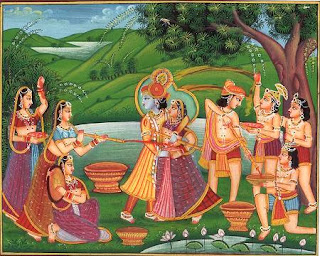










0 Response to "Son of Vishnu "
Post a Comment